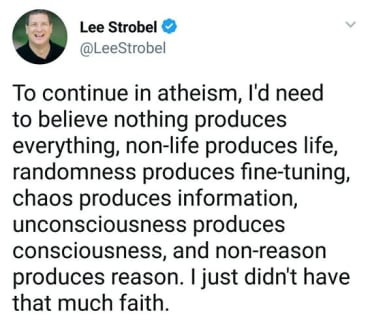Atheism;
You live 70-80 years if you’re lucky, then you die. Unless you’re a handful of famous/infamous people, after a couple of generations, nobody remembers you anymore. So, what is the real purpose of your life?
If you’re an atheist, there is no real purpose. You may say that you want to make the world a better place. But you’re just a bunch of electrons, protons and neutrons randomly thrown together. Where did this idea of making the world a better place come from? Certainly not from a bunch of matter randomly thrown together.
In fact, you act the way you act because your genes (which are just a bunch of electrons, protons and neutrons) tell you how to react. Atheist philosopher Michael Rise says “…ethics, as we understand it, is an illusion fobbed off on us by our genes, to get us to cooperate…ethics is a shared illusion of the human race.” One wonders how our genes know how to get us to cooperate.
Atheist philosopher William Provine says, “There is no ultimate foundation for ethics, no ultimate meaning for life, and no free will for humans either (because our genes determine our actions).”
Atheist filmmaker Woody Allen says in a Newsweek magazine article, “I make movies not to make any type of grand statement but simply to take my mind off the existential horror of being alive.” Allen numbs this bleakness with humor.
Atheists say that;
– you’re nobody special. You’re just a conglomeration of chemicals.
– there’s no special purpose to your life. You live, you die, you cease to exist. There is no afterlife.
– there’s no right and wrong. Just an agreed upon set of morals to live by that can and will change over time.

Yet humans do have a universal morality. Its expressions may vary but there are certain universals. Where did these morals come from? Humans are a hopeful group. Where does this hope come from? Why do we consider suicide an unfortunate option, one that is looked with pity on? Why do we look on adultery as wrong? Because we violated our promise to another person, you say. But if there are no absolute morals, why is adultery wrong? So you temporarily changed our mind, so what? But we do feel guilty when we commit adultery. Any morality atheists have is borrowed from other religions.
If you don’t believe in God, there is nothing to live for, no afterlife to look forward to, no reason to live a good life because there are no absolute morals, only an agreed upon set of opinions. Its all vanity of vanities (Ecclesiastes 1:2-11). But you say, mankind is getting better. There are brighter days ahead. What makes you say that? Its just the chemicals in your brain saying that. But what makes chemicals think? After observing the 20th century where more people were killed than in any other century, what makes you think so positively about our chances of survival? Humanity’s actions speak otherwise. Your heart’s desire that humanity will get better but why do you think that? If there is no God, where does that thought come from? If there is no purpose in life, after a devastating event (like the death of a spouse), then suicide becomes a rational option.
Any way you look at it, atheism doesn’t square up with reality on just about anything.

Christianity;
It is universal that everyone has a yearning to feel that they matter, that their life and what they did with it matters. We all want meaning and purpose in our lives. Where does this yearning come from? We have a desire for our children to live a good, productive life. Parents are protective of their children. We will sacrifice for them. Why? Where do these feelings come from? If our spouse or child is drowning, why would you try to save them? Where does this feeling come from? We have an innate desire to be productive. Work satisfies this. We desire friendship and being part of a good community of friends. Why do we have these desires? Where do they come from? Atheism has no answer for these yearnings, but Christianity does.
Christianity says we’re made in the image of God, that we’re made with eternity in our hearts. That’s why we look forward to a better world here and now but also in the afterlife. It’s also why we don’t consider suicide a rational alternative. We love other people because God loves us and we’re made in His image. We sacrifice for our loved ones because God sacrificed His son, Jesus, for us. We have hope because He instilled it in us. We have a certain morality because we’re made in His image and He’s a moral God. We feel bad when we fall short of His morality. Only when we repeatedly violate His morality on a constant basis can our consciousness become “seared”. This is what happens to serial killers and people like Stalin, Mao and Hitler. We are protective of our spouse and children because He is protective of us and He sacrificed His only son to be in a relationship with us.
We want to learn and advance our society because God gave us dominion over the created cosmos (Genesis 1:26-28) and wanted us to rule it according to His standards. But because we are fallen human beings, we fall short of this mandate. Yet we still strive for it.
Christianity squares up with reality. Atheism doesn’t.
For the sake of the Name,
Dave Maynard
Home

